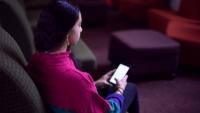Support for Survivors of Sexual Violence

Columbia University and CUIMC offers timely, free, and comprehensive services and support for survivors of sexual and gender-based violence. If you’ve experienced any form of sexual violence, abuse, or harassment, we strongly encourage you to seek the support you need.
Columbia Health's Sexual Violence Response (SVR)
Columbia Health’s Sexual Violence Response (SVR) provides trauma-informed, confidential support through crisis counseling/intervention, advocacy, prevention, and outreach. Our 24-hour helpline is available 7 days a week, 365 days a year to connect to an advocate at 212-854-4357 (HELP).
Our Mission
SVR’s mission is to eradicate all forms of gender-based violence. Through collective community action, SVR is committed to social change and creating a culture of accountability.
How We Can Help
SVR Survivor and Peer Advocates provide survivors and their supporters (co-survivors) with confidential emotional support, accompaniment and referrals to on-campus and off-campus resources. They help survivors make informed decisions about their medical, legal, and disciplinary options. Survivor and Peer Advocates are certified by the Department of Health and receive a minimum of 40 hours of training, as well as ongoing education and supervision. More information can be found on the Sexual Violence Response homepage.
CUIMC students can also get support by visiting any SVR office:
- Morningside: Lerner 700
- Barnard: Hewitt 105
- CUIMC: 50 Haven Ave. 206
Located at 50 Haven Ave, with accessible entrance at 60 Haven Ave
Volunteer with SVR
SVR provides volunteer opportunities for students as Peer Advocates or Peer Educators. Peer Advocates provide survivors and their supporters with confidential emotional support, accompaniment and referrals to on-campus and off-campus resources. They help survivors make informed decisions about their medical, legal, and disciplinary options.
Peer Advocates receive 40 hours of training and are supervised by advisors at Columbia and Barnard. Peer Educators provide the campus community with information about sexual violence and relationship abuse, campus services available for survivors and co-survivors, positive ways to communicate about sex, social and cultural norms that can contribute to violence, and ways in which we can get involved to create a safe and supportive environment where sexual violence is not tolerated.